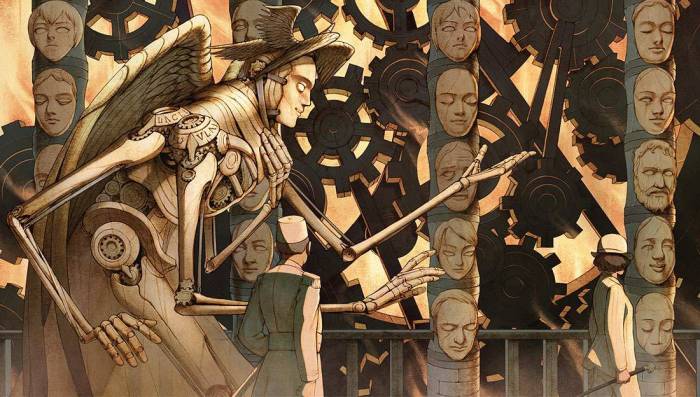 Let’s start with an introduction: Who is P. Djèlí Clark?
Let’s start with an introduction: Who is P. Djèlí Clark?
I’m a writer of speculative fiction by night and a mild-mannered assistant professor of history by dayd. Neither of those personas fights crime.
Your latest novella, The Haunting of Tram Car 015, will be published by Tor.com early next year. It looks really interesting: How would you introduce it to a potential reader? Is it part of a series?
The Haunting of Tram Car 015 takes place in the same world as a 2016 novelette published on Tor.com titled, A Dead Djinn in Cairo. Set in an alternate 1912 Egypt of steampunk, djinn, magic and clockwork angels, that initial story follows the exploits of Special Investigator Fatma el-Sha’arawi of the Ministry of Alchemy, Enchantments and Supernatural Entities — tasked with policing the boundaries of the supernatural and the mundane. The Haunting of Tram Car 015 opens up this world further through two new characters — Agents Hamed Nasr and Onsi Youseff — as they attempt to deal with a case of magic and transportation gone awry. Hilarity and hijinks ensue.

What inspired you to write the novella and series? And where do you draw your inspiration from in general?
I’ve always liked counterfactuals that radically rewrite the power dynamics of our world. Novels like Steven Barnes’s Lion’s Blood saga or Kim Stanley Robinson’s The Years of Rice and Salt come to mind. My series has a decidedly lighter tone, but was based on the same premise. I wanted to create a non-western society that subverted the Orientalist and colonialist themes that permeate too much of genre. My setting became an early twentieth-century Cairo, remade as a hub of modernity, populated by jinn, and retro-futurist steampunk technology. Because why not?
How were you introduced to genre fiction?
Though I was born in the US, I spent some of the earliest days of my life in my parents Caribbean homeland. There, I was surrounded by lots of popular folklore derived from my Afro-West Indian family and East Indian neighbors. That laid much of my foundation for an interest in the fantastic. When I returned to the US, my parents continued to feed my interest. My father let me stay up with him watching his favorite sci-fi movies. My mother introduced me to old Twilight Zone series. Best of all, they took me to the public library to check out books to my heart’s content. Been a love affair with literary genre ever since.

How do you like being a writer and working within the publishing industry?
It’s a new thing for me. I tried to “break” into the industry for a long time with little success. I walked away from writing out of frustration for a minute and returned in 2010. Slowly, with lots of patience, I began learning the SFF writing and publishing industry and have been fortunate to make it through the door. Still, took another eight years to get to this far — and still lots of mountains to climb. I love it. But it’s been work.
Do you have any specific working, writing, researching practices?
My training is as an academic historian. When I start a new SFF writing project I employ lots of that research training to flesh out information — be it on culture, language, history, etc. This helps me build the worlds I want to explore. I let the stories (and writing) flow from there.

When did you realize you wanted to be an author, and what was your first foray into writing? Do you still look back on it fondly?
I think I’ve always been writing something. Part of it was that I read — a lot. Seemed only natural to emulate what I devoured between those pages. Early on, I made small picture books for myself and my younger sister. Then it was short stories or comics well through high school, mostly for friends. It wasn’t until late in college that I thought of actually being a writer — to create works for public consumption. I still have some of those earliest forays. I look back at some of them fondly — between the cringing.
What’s your opinion of the genre today, and where do you see your work fitting into it?
There’s a lot more of it. Increasingly more diverse with fresh perspectives and angles. It’s been really inspiring and I hope my own work adds to this call for new perspectives and voices.
Do you have any other projects in the pipeline, and what are you working on at the moment?
I try to keep a few things lined up, though there’s hardly enough time. WIP: A gothic horror set during the Red Summer of 1919. With music.
What are you reading at the moment (fiction, non-fiction)?
Fiction: How Long Til’ Black Future Month by N.K. Jemisin. Non-Fiction: Birthright Citizenship: A History of Race and Rights in Antebellum America by Martha S. Jones.

If you could recommend only one novel or book to someone, what would it be?
I can’t! There’s just too many.
What’s something readers might be surprised to learn about you?
The 1973 Jesus Christ Superstar film with Carl Anderson as Judas is one of my favorite musicals.

What are you most looking forward to in the next twelve months?
Watching my brand new infant twin daughters grow, and thinking up the stories I’m going to tell them.
Thanks for these questions. They were great!
*
P. Djèlí Clark‘s The Haunting of Tram Car 015 is due to be published by Tor.com on February 19th, 2019, in North America and in the UK. Tor.com has also published Clark’s The Black God’s Drums. A Dead Djinn in Cairo (which I highly recommend) is available as an eBook and also free on Tor.com.
[…] on CR: Interview with P. Djèlí Clark […]
LikeLike